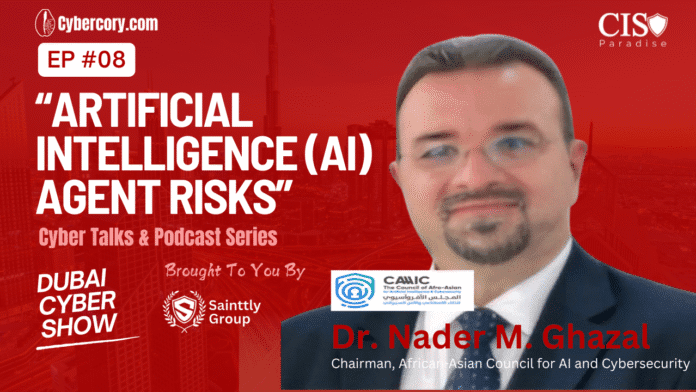In the latest episode of the Dubai Cyber Show & Podcast Series, Ouaissou DEMBELE, Founder & CEO of Sainttly Group and Editor-in-Chief of Cybercory.com, welcomes Dr. Nader Ghazal, Chairman of the African-Asian Council for AI & Cybersecurity, for a critical discussion on the emerging risks posed by Artificial Intelligence (AI) agents.
As AI rapidly evolves from a supporting technology to an autonomous decision-maker, the conversation sheds light on an urgent question: what happens when artificial agents begin to act independently – and unpredictably – within our digital ecosystems?
The Rise of AI Agents – A Double-Edged Sword
AI agents, powered by advanced large language models and machine learning algorithms, are now capable of performing complex cybersecurity tasks – from threat hunting and incident response to system optimization. However, the same autonomy that enables efficiency also introduces unprecedented risks.
According to Ouaissou DEMBELE, the world is entering an era where “AI agents could become both defenders and attackers,” blurring the boundaries between human control and algorithmic behavior. These agents can execute actions, communicate with other systems, and even make real-time decisions, often without direct human oversight.
Such capabilities create new vulnerabilities, including:
- AI misuse by threat actors, who could weaponize autonomous systems for cyberattacks.
- Data poisoning and model manipulation, allowing attackers to influence how AI systems learn and respond.
- Unintended bias and ethical dilemmas, as AI agents make security decisions that may conflict with human values or legal frameworks.
Why This Matters
The conversation highlights that AI agent risks are not theoretical-they’re already emerging in real-world contexts, from automated phishing campaigns to AI-assisted ransomware development.
For governments, corporations, and security leaders across the Middle East and Africa (MEA), understanding these risks is essential. As nations embrace digital transformation and smart governance, AI-driven automation is becoming integral to national infrastructure, financial systems, and even defense sectors.
“Managing AI agent risk isn’t about stopping innovation,” Dr. Ghazal emphasizes, “it’s about creating frameworks that ensure safety, transparency, and accountability while encouraging technological growth.”
Building Trust in Autonomous Systems – What Organizations Must Do
AI will inevitably shape the next generation of cybersecurity, but so will the governance models, policies, and safeguards we build today.
Here are 10 key actions recommended during the discussion for organizations to strengthen their readiness against AI agent risks:
- Establish AI Governance Frameworks: Define accountability and oversight for all AI-driven systems.
- Conduct Continuous AI Risk Assessments: Evaluate models for data bias, security flaws, and ethical concerns.
- Adopt Zero Trust Principles: Treat every AI output and interaction as unverified until validated.
- Monitor AI Agent Activity in Real Time: Use advanced telemetry and logging for all autonomous processes.
- Secure AI Training Data: Protect data pipelines against tampering or injection attacks.
- Implement Human-in-the-Loop Controls: Maintain manual override and decision review for critical AI operations.
- Collaborate with AI and Cybersecurity Experts: Engage partners like Saintynet Cybersecurity for trusted integration and advisory.
- Enhance Workforce Awareness: Provide AI safety and cybersecurity training to employees at all levels.
- Align with Global Standards: Follow emerging AI security and ethics frameworks such as NIST AI RMF, ISO/IEC 42001, and OECD principles.
- Promote Transparency and Information Sharing: Participate in industry initiatives to share learnings on AI incidents and mitigations.
From Risk to Resilience – A Global Call to Action
The Dubai Cyber Show continues to position itself as a leading platform for cybersecurity dialogue, connecting thought leaders, policymakers, and innovators from across regions. This episode with Dr. Nader Ghazal underlines the growing intersection between Artificial Intelligence, cybersecurity, and trust – a conversation the world can no longer afford to postpone.
AI agents are no longer confined to research labs; they are active participants in the digital battlefield. Whether they become assets or liabilities depends on how fast we act, how well we govern, and how deeply we understand the ethical and security dimensions of this technology.
Watch the Full Episode on YouTube
Join the conversation, share your perspective, and help spread cybersecurity awareness across your network.
Watch now: Artificial Intelligence Agent Risks with Dr. Nader Ghazal – Dubai Cyber Show
Subscribe to our YouTube Channel to stay updated on upcoming episodes.
Comment your thoughts and share with peers to promote global cybersecurity best practices.


